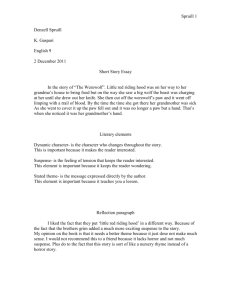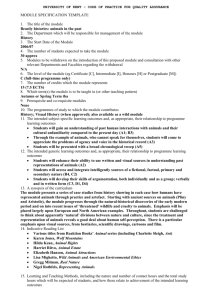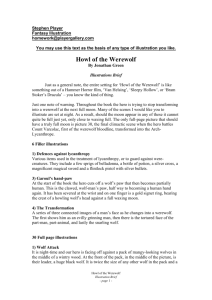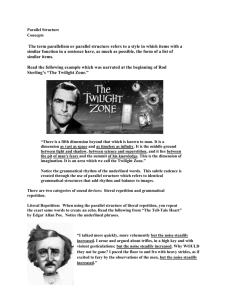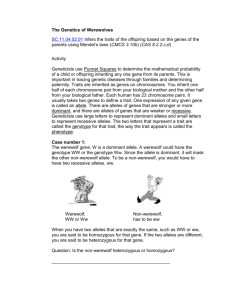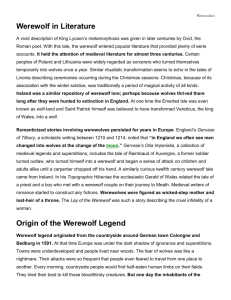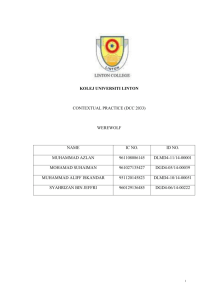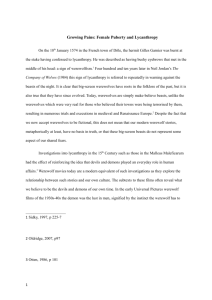Werewolves in Literature
advertisement
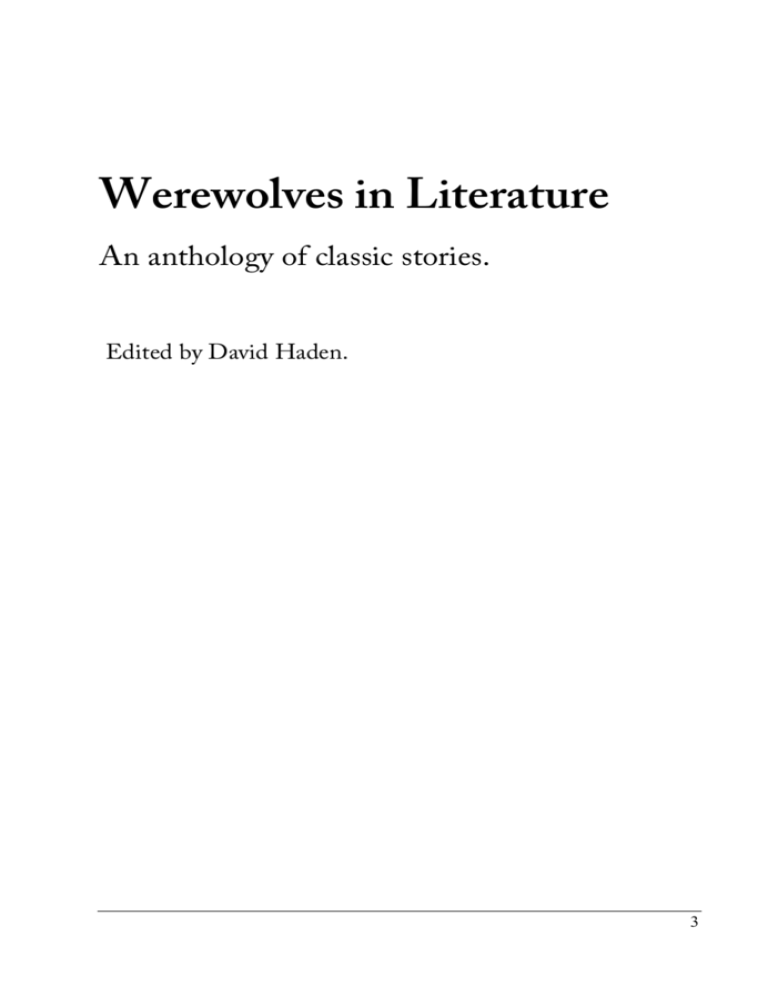
Werewolves in Literature An anthology of classic stories. Edited by David Haden. 3 CONTENTS 1. THE WEREWOLF OF PONKERT (1925), by Harold Warner Munn. —“One of the grimmest werewolf stories ever to appear” — The Essential Guide to Werewolf Literature (2003). 2. GABRIEL-ERNEST (1909), by Saki (Pen name of H.H. Munro). —“a classic short story based on accounts of the historical Gevaudan werewolf trials. It scared the crap out of me” — The Latin Mouse. —“other Saki youths may look like and pose themselves like Ganymede, Hylas, or Hyacinthus, ... but Gabriel-Ernest is something else” — Sandie Byrne, The Unbearable Saki: the work of H.H. Munro (2007). 3. THE SHE-WOLF (1912), by Saki (Pen name of H.H. Munro). —“Saki's classic, and widely anthologized, short story” — litgothic.com 4. THE WHITE WOLF OF THE HARTZ MOUNTAINS (1839), by Frederick Marryat. —“the first appearance of the female werewolf in Victorian literature.” — Monster Scholar. 4 5. THE MARK OF THE BEAST, by Rudyard Kipling. —“For pure horror, this tale is, perhaps, unmatched in English literature” — Frederick Knowles, in A Kipling Primer. 6. THE WEREWOLF (1911), by Eugene Field. —“Eugene Field gives a new turn to the idea by representing the werewolf curse as a definite atavistic throw-back” — Dorothy Scarborough, The Supernatural in Modern English Fiction. 7. THE WOLF (1921), by Guy de Maupassant. —“[in this story] we meet with savage beasts and men more savage yet than they” — Montague Summers, The Werewolf in Lore and Legend. 8. RUNNING WOLF (1920), by Algernon Blackwood. —“Another good and ingenious mystification” — Punch. 9. THE LAY OF THE WERE-WOLF (trans. 1911), by Marie de France. —“The Breton fable recorded by Marie de France, probably in the latter part of the 12th century” — The Encyclopedia of Vampires, Werewolves, and other Monsters. 10. MORRAHA, by Joseph Jacobs (1892). —“The Celtic materials are so rich that it would tax the resources of a whole clan of Grimms to exhaust the field” — Joseph Jacobs. 5 11. BEWARE THE CAT, by William Baldwin (1500s) —an extract from the first novel ever published in English. 12. THE OTHER SIDE (1893), by Count Eric Stenbock. — “a dreamlike werewolf tale ... [a] strangely beautiful tale” — The Essential Guide to Werewolf Literature. 13. THE WHITE WOLF OF KOSTOPCHIN (1889), by Sir Gilbert Campbell. — “One of the most enjoyable stories from the heyday of the oldfashioned werewolf yarn ... the storyline and old-world setting are perfect” — The Essential Guide to Werewolf Literature. 14. OLALLA (1885), by Robert Louis Stevenson. — “Olalla is one of his most impressive stories, not least because of its carefully controlled tension ...” — John R. Hammond, A Robert Louis Stevenson Companion. — “If there was ever grim and grimacing art, one would think it was in that twisted figure [of Olalla]” — G.K. Chesterton. — “In Olalla we have, what is so rare in Stevenson, a treatment of passionate love” — Robert Louis Stevenson: a life study in criticism. 6 15. IN THE FOREST OF VILLEFERE (1923), by Robert E. Howard. — “one of the most terrifying werewolves tales I have ever read” — Italian critic Mario Guslandi, in a review at SF Site (sfsite.com). — “a classic werewolf tale” — comics journalist Tom Stewart at salon.com. 16. THE CAMP OF THE DOG (1908), by Algernon Blackwood. — “as a psychoscientific study of lycanthropy, it is one of a kind” — Survey of Modern Fantasy Literature, Vol. 3 (1983). — “The Camp of The Dog is a masterpiece of psychological detection.” — Joseph A. Kestner in The Edwardian Detective, 1901-1915 (2000). 17. A PASTORAL HORROR (1890), by Sir Arthur Conan Doyle. — “crime fiction of the best kind” — The Armchair Detective (1985). 18. THE WERE-WOLF (1895), by Clemence Houseman. 19. THE WERWOLVES (1898), by Henry Beaugrand. 20. THE BEAUTIFUL BOY AND THE WERE-WOLF (1901), by Ignacz Kunos (trans. R. Nisbet Bain). 21. THE SAGE OF THE VOLSUNGS (13th century) (three short extracts, translated by William Morris). 7 22. THE DAUGHTER OF THE VLKOLAK (1858), (Slovakian folk tale). 23. HUGUES, THE WER-WOLF (1838), by Sutherland Menzies (assumed to be the pen-name of Elizabeth Stone, 1808-1876). 24. A BALLAD OF THE WERE-WOLF (1890), by Graham R. Tomson (the pen-name of Rosamund Marriott Watson). With a new English translation by David Haden, from the Scots dialect. 25. THE LYCANTROPIST (1850), by Catherine Crowe. 8 THE WEREWOLF OF PONKERT, by Harold Warner Munn. PROLOGUE IN THE PAST when I toured in France, invariably I made a point of never failing to stop at a certain tavern, about thirty miles from Paris. I will not give you more definite directions for reaching it, for it was a discovery of my own, and as such I would share it with no one. The fact that the inn has very pretty serving maids is but incidental, the real reason of my visits being the superlative excellence of the wine. Many a night have the old Pierre and I sat, smoked and drunk till the wee hours of the morning, and many have been the experiences we have exchanged of wild, eery adventure in various parts of the globe. Pierre also was a great traveller and seeker after adventure before he drifted into the backwater of this placid village, to finish there the remainder of his days. One night (or morning, I should say), Pierre grew indiscreet under the influence of his nectar, and let fall a few words so pregnant of possibilities that I scented a mystery at once; and when he was sober I demanded an explanation. And, having said so much, seeing that he could not dissuade me, he brought forth proof of his dark hints in regard to a horrible occurrence in the annals of his family. 9 The proof was a book, bound in hand-tooled leather, and, locked by a silver clasp. When open it proved to be written in a crabbed hand in old Latin on what was apparently parchment, now yellow with age, but must, when new, have been remarkably white. It comprised only four leaves, each a foot square, and glued or cemented to a thin wooden backing. They were written on only one side and completely covered with this close, crabbed Latin. On the back of the book were two iron staples, and hanging from each, several links of heavy, rusted chain. Evidently, like most valuable books which were available to the public in the past, it had been chained fast to something immovable to prevent theft. Unfortunately, I cannot read Latin, or in fact any languages but French and English, although I speak several. As a consequence, it was necessary for my friend to read it to me. After I had recovered from the numbness which the curious narrative had thrown over me, I begged him to read it again — slowly. As he read, I copied; and here is the tale for you to judge and believe as you see fit. Told in Hungarian, transcribed in Latin, translated into modern French and from that into English, it is probably both garbled and improved. No doubt anachronisms abound, but be that as it may, it remains without dispute the only authentic document known of a werewolfs experiences, dictated by himself. 10 CHAPTER ONE HAVING BUT A FEW HOURS IN WHICH TO LIVE, I dictate that which follows, hoping that someone thereby may be warned by my example and profit by it. The priest has told me to tell my story to him and he will write it down. Later it will be written down again, but I do not care to think of that now. My name is Wladislaw Brenryk. For twenty years I lived in the village where I was born, a small place in the northeastern part of Hungary. My parents were poor and I had to work hard — harder, in fact, than I liked, for I was born of a languid disposition. So I used my wits to save my hands, and I was clever, if I do say it myself. I was born for trading and bargaining, and none of the boys f grew to manhood with could beat me in a trade. Time went on, and before I had reached manhood my father died in a pestilence. Although my mother was pestilence salted (for she had the plague when she was a little girl and recovered), she soon gave up, grew weaker and weaker, finally joining my father in the skies. The priest of our village said that it was the trouble in her lungs that killed her. Alone and lorn for the first time in my life, I could not bear to remain longer amongst the scenes of my boyhood. So on a fine spring morning I set forth carrying on my back those possessions which I could not bring myself to part with, and around my waist a well-stuffed money belt, filled with the results of my trading and the sale of our cottage. For several years I wandered here and there, for a time horse trading, then again a peddler of jewelry and small articles. Finally I came to Ponkert, and 11 started a small shop in which I sold beautiful silks, jewels and sword hilts. It was the sword hilts that sold the best. They were highly decorated with golden filigree, and encrusted with precious stones. Chiefs and moneyed nobles would come or send messengers for many miles to obtain them. I gained a reputation for honesty and fair dealings, likewise a less enviable notoriety for being a miser. It is true that I was careful and cautious, but I defy anyone to prove that I was parsimonious. I had closed up the shop for the night and harnessed the horses for the long drive home, when for the first time I wished that I lived in the village instead of being so far away. I had always enjoyed the ride before; a man can think much in a ten mile ride, and it gave an opportunity to clean my mind of the day’s worries and bickering, so as to come to my dear wife and little daughter with thoughts only of them. What made me look forward with anxiety to the long ride home was the many broad gold pieces secreted in my wallet. I had never been molested on that road, but others had been found robbed and partly devoured, with tracks of both men and beast about them in the snow. Obviously, thought I at the time, thieves had beaten them down, leaving them for the wolves. But there was a disturbing factor in the problem; not only were the bodies horribly mutilated and the beast tracks about them extraordinarily large for wolf tracks, but the feet of the men were unprotected by any covering whatever! Barefooted men roaming through the forests, in the snow, on the slim likelihood of discovering prey which could be forced to yield wealth! The very idea was improbable. If I had only known then what I know now, my entire life might have been changed; but it was not so to be. 12 To return to my story: It was known that I had a large amount of money in my possession, for that afternoon the chief of a large Tartar caravan which was passing through had stopped at my shop and taken six of my best sword hilts, leaving their equivalent in gold. So I had cause enough to worry. I looked about for some sort of weapon, and found a short iron bar which I tucked beneath the robes of the sleigh; then I spoke to the mares, and we were off on the long ride home. For a long time we went creaking along, the sleigh runners squeaking on the well-packed snow. Frost was in the air, and the stars gleamed down coldly upon the dark forest, hardly lighting the road. As yet the moon had not risen. I turned from the main traveled highway and took the river road. This left the forest behind, but the traveling was much worse. Exposed to the winds, the light snowfall of the morning had drifted, and the roadway was choked. I thought of leaving the road and taking to the smooth surface of the river which gleamed brightly to the left, but this would have meant a mile or more extra to travel, for the river curved in a great bend opposite our home, and there was an impassable barrier of small trees and brush for some distance. The moon was rising over the hill I had just quitted, and as the beams struck upon me, I was suddenly seized by a fit of the most unaccountable terror. This peculiar feeling held me rigid in my seat. It seemed as if a hand of ice had been suddenly laid upon the back of my neck. The mares, it was evident, had felt this strange thrill, also, for they had imperceptibly increased their speed without urging of mine. Indeed, I could not have moved a muscle while that spell was upon me. 13 Soon we dipped down into the hollow at the hill’s foot, and the power that had frozen me was removed. A strange feeling of exaltation and happiness swept over me, as if I had escaped from some terrible and unthinkable danger. Hai! I shouted, rising in the sleigh and cracking my whip. The mares responded nobly, and we started to climb the next hill. As we did so, a fiendish howling came down the wind, but faintly, as if it were some distance away. I stopped the mares and stood up in the sleigh, the better to listen. Faintly and far away sounded the cries, mellowed by distance. Then they grew louder and louder as the brutes came nearer, and over the top of the hill I had just quitted swept the devilish pack! They were on my trail, and it was only too plain that before I could reach home they would be upon me. There was only one chance, and I took it. I clucked to the horses and turned them on to the ice of the river where lay a straight, smooth roadway. As long as the mares kept their feet, I was safe. But if one should stumble-! Then that same spell of horror threw its icy mantle over me again; I sagged back; the mares took the bit in their teeth, and we rushed like a thunderbolt down the river. Little puffs of diamond dust shot from the ice into my lap as the steel-shod hoofs rang and clicked. On we tore, while I sat in the sleigh like a stone, unable to move a muscle. Faster and faster we rushed between the banks of brush that fringed the icy causeway. 14 Fainter re-echoed the demoniac ululations behind me, until at last they ceased altogether and the horses gradually slackened their furious pace. Here the spell left me, nor did it ever come again. Now we traveled at a trot, which slowed until the mares were but walking along, their panting breath paling their dark heaving sides to gray, in the frosty air. Then we rounded the bend, and I saw black, open water ahead. Here progress, perforce, ceased. There was no way out, except to turn back and mount the bank where less underbrush grew, then into the smooth plain beyond and homeward. So I tugged at the rein, and we swerved half way around. In that moment of unpreparedness, all became confusion. A gloating chuckle sounded evilly from the farther bank, and five great gray shapes charged at me across the Ice. To think was to act with me. I have always been a creature of impulse. and almost instinctively I turned back, slashing the mares till they reared and we plunged straight forward into the onrushing mass of bodies. This resolute move took the beasts by surprise and halted them. They scattered, and I was through, with a clear road before me. But my escape was not so to be accomplished. Silently, from the shelter of an overhanging rock, trotted two more of the creatures; a very giant of a beast, gaunt and gray, beside which moved a small black one. Roaring, the gray flung himself at the horses, which reared and plunged in terror; and the rest were upon me from the rear. 15 Then, turmoil of battle, pandemonium of sound, through which cut like a knife the scream of a horse. One was down! I felt the sleigh lurch to one side; heavy bodies struck at me, sharp teeth tore; but I kept my balance until one, such was his velocity, struck me and laid me flat in the bottom of the sleigh, himself rebounding and shooting over the side. Something offered itself to my hand. Something cold and metallic. I raised my arm, smote, felt steel bite bone, felt bone crunch beneath my stroke. I laid about me like a madman, with the bar, and cleared a space. I stood erect and waited for the attack. But no instant attack followed. The menace of the bar was apparently too strong, and one by one they sank down on their haunches to rest or to wait. Jaws gaped wide, and tongues lolled. Panting, they rested after the long run. As I stood there in the sleigh, watching them, it seemed as if they were laughing, ghoul-like, at my horrible plight. As I soon found, they were! I became conscious of a noise behind me, a small noise such as the wind might make blowing a dead leaf across the bare ice; a sound like dead twigs rustling in the breeze, a faint scraping of claws, a padding of feet; and turning, I looked straight into the red glaring dots which were the eyes of the black wolf! I shouted hoarsely, swung up the bar and brought it down with every ounce of force that I possessed. Unfortunately for myself, the beast, and Hungary, the great gray creature which ran at his side swerved and took the blow instead, catching him squarely between the eyes. 16 He grunted, choked; a stream of blood shot from his mouth and nostrils, and his eyelids opened and closed convulsively. Then he collapsed. The bar had crashed through his head. I whirled, expecting to be overwhelmed by the six that still lived, but to my intense surprise the surge of bodies that I had seen from the tail of my eye, when I struck at the black wolf, had subsided, and they were now loping round and round the sleigh. As they moved, the stricken mare followed them with her pain-filled eyes, while the one that was unharmed struggled constantly to be free. As the black leader passed me in the circling route, I, likewise, slowly turned to keep him always in sight. Instinct told me that from him would come my greatest danger. Now I noticed a strange thing. About the necks of each of the five gray beasts there hung upon a thong a leathern pouch about the size of a large fist. These pouches hung flat and flaccid as if they were empty. The black, examine as closely as I might, wore none. Then, as with one accord, they stopped in their tracks, and sank on their haunches. That for which they had been waiting had at last occurred. There seemed to be some sort of a silent signal given. Simultaneously they lifted their heads and loosed a long, low wail, in which seemed to hang all the desolation and loneliness of eternity. Thereafter none moved or uttered a sound. 17

